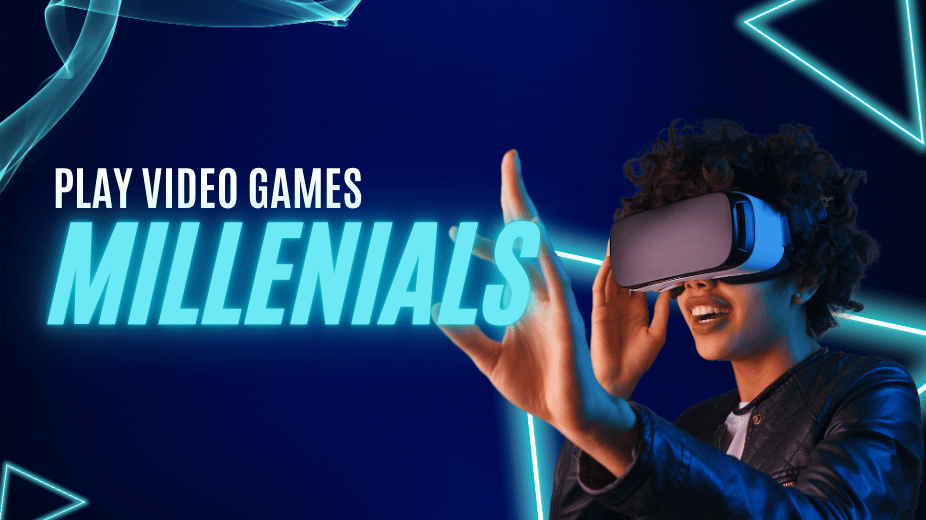

21/12/2024
Administrator
Before understanding the extent to which millennials engage with video games, it's crucial to define who they are. Generally, millennials are those born between 1981 and 1996. They came of age during a period of significant technological change, with the rise of the internet, mobile phones, and personal computers shaping their worldview. This unique upbringing means that millennials are often seen as digital natives—individuals who grew up with technology integrated into their daily lives.
The millennial generation is diverse, with varying interests and backgrounds, but one commonality among them is their comfort with technology. This natural affinity for digital tools has influenced their entertainment choices, leading to a strong connection with video games.
The gaming industry has seen a massive boom over the past two decades, and millennials have played a pivotal role in this growth. As of recent studies, approximately 70% of millennials report playing video games regularly, making this demographic one of the largest groups of gamers. This is a striking figure, considering that video games were once seen as a hobby reserved for children and teenagers.
Millennials, now in their 20s and 30s, are playing games for several reasons. For some, it’s a nostalgic activity, a way to reconnect with the video games they grew up with. For others, it’s a way to bond with friends, especially with the rise of online multiplayer games and social gaming platforms.
Gaming consoles, mobile games, and PC gaming have all contributed to the increased engagement of millennials in the gaming world. The variety of gaming platforms available today means that there is something for everyone, from action-packed shooters to casual mobile puzzle games. The accessibility and range of choices are crucial factors in the high percentage of millennials who are playing video games.
Gaming consoles like the PlayStation, Xbox, and Nintendo Switch have been essential to the gaming habits of millennials. These devices offer a diverse library of games, from single-player story-driven titles to intense multiplayer experiences. Many millennials grew up with these consoles and continue to use them in adulthood. As technology advances, these consoles have become more sophisticated, offering enhanced graphics, immersive sound, and increasingly complex game mechanics.
For the more dedicated gamers, PC gaming has become a dominant force. Customizable rigs, high-end graphics cards, and the ability to modify games have made PC gaming an attractive option for millennials seeking a more tailored experience. The rise of streaming platforms like Twitch and YouTube has further fueled the PC gaming culture, allowing millennials to share their gaming experiences with a wider audience.
While traditional gaming consoles and PCs remain popular, the surge in mobile gaming cannot be ignored. Smartphones and tablets have revolutionized the way people access entertainment, and millennials are at the forefront of this shift. According to a recent survey, around 60% of millennials report playing mobile games regularly, making this one of the most significant trends in the gaming world.
Mobile games offer the convenience of playing anywhere, whether on a commute, at work during breaks, or at home. The simplicity and accessibility of games like Candy Crush, Clash of Clans, and Pokémon Go have made mobile gaming a favorite pastime for millennials. These games are often free to play, with the option to purchase in-game items or upgrades, making them even more appealing to the millennial audience.
One of the defining features of millennial gaming is the sense of community that comes with it. With the rise of social media platforms and online communities, millennials can now connect with other players worldwide, creating a shared gaming culture. Online multiplayer games such as Fortnite, League of Legends, and Overwatch have become incredibly popular, not just for the gameplay itself, but for the social aspect that they provide.
Esports has also played a significant role in shaping millennial gaming habits. The growth of competitive gaming has created professional leagues, tournaments, and live-streaming opportunities that have further embedded gaming into the social fabric of millennial life. Twitch and YouTube Gaming have become platforms where millennials not only play games but also watch others play, often creating a sense of camaraderie and connection.
For many millennials, gaming is not just about entertainment—it’s a way to socialize. Online multiplayer games allow them to communicate with friends in real-time, regardless of geographic location. Voice chat features, co-op gameplay, and team-based challenges all contribute to a sense of togetherness, making video games an increasingly social activity.
Understanding the motivations behind millennial gaming habits is key to appreciating the true impact of video games on this generation. Millennials play video games for a variety of reasons, many of which are deeply rooted in the culture and challenges they face today.
Life in the digital age can be stressful. Between navigating demanding careers, handling student debt, and dealing with the pressures of social media, millennials often seek escapism in video games. Immersing themselves in a virtual world allows them to temporarily disconnect from real-life challenges and enter a space where they have control. The appeal of video games lies in their ability to offer a temporary refuge from the complexities of daily life.
Many millennials are drawn to video games because they provide a sense of accomplishment and mastery. Games often have structured objectives, levels to complete, and achievements to unlock. The feeling of progress, of getting better at something over time, is immensely satisfying. For millennials, gaming can offer a boost in self-esteem and a sense of personal achievement that may be harder to come by in other areas of life.
Video games offer a platform for creativity and self-expression. Many games allow players to customize characters, design in-game spaces, or create content. For millennials, these creative outlets can be deeply fulfilling. Games like Minecraft and The Sims offer unparalleled freedom for players to express themselves in ways that traditional media cannot.
As millennials continue to age, their relationship with video games will evolve. The next few years are poised to see significant changes in the gaming landscape, driven by advancements in technology and shifts in cultural trends.
Virtual reality and augmented reality are poised to revolutionize the way millennials engage with video games. With platforms like Oculus Rift and PlayStation VR, millennials can step into fully immersive digital worlds, further blurring the lines between reality and fantasy. As technology improves, VR and AR gaming could become the next big frontier for millennial gamers.
Another exciting development is cloud gaming, which allows players to stream games from powerful servers rather than relying on personal hardware. This opens up the possibility of playing high-quality games on any device, from smartphones to low-end PCs, without needing expensive consoles or gaming rigs. Google Stadia, Microsoft’s Project xCloud, and NVIDIA GeForce Now are already paving the way for this next-generation gaming experience, making gaming more accessible than ever.
The millennial generation has been instrumental in shaping the gaming industry as we know it today. Approximately 70% of millennials engage in video gaming, making it one of the most significant forms of entertainment in their lives. From traditional gaming consoles and PC games to mobile and social gaming platforms, millennials are redefining what it means to be a gamer.
As technology continues to advance and new trends emerge, it’s clear that the love affair between millennials and video games will only grow stronger. Whether it’s for escapism, socialization, or creative expression, video games have cemented their place as a central part of millennial culture. As the gaming industry evolves, millennials will undoubtedly remain at the forefront, shaping the future of gaming for generations to come.
Millennials and video games—the relationship is far from over.